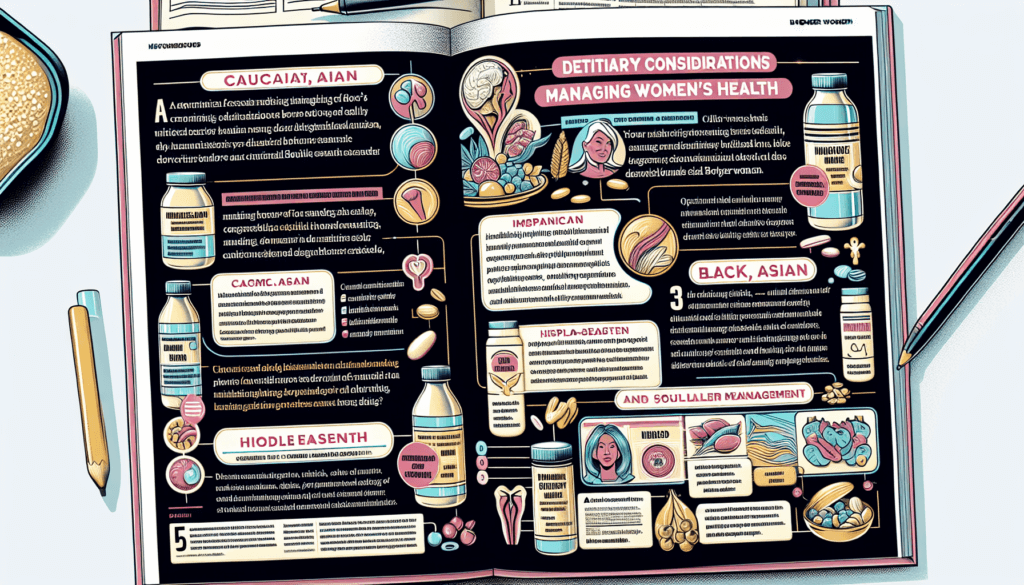Are you a boomer woman looking to prioritize your health and well-being? Then it’s essential to understand the dietary considerations specifically tailored for you. With age, our bodies undergo numerous changes, and it becomes increasingly important to nourish ourselves with the right nutrients. In this article, we will explore the dietary considerations that can help boomer women manage their health effectively. From maintaining bone strength to managing menopause symptoms, we will delve into the key dietary factors that can support your well-being and help you thrive in this stage of life. So, let’s embark on this journey of understanding how to best nourish your body for optimal health and vitality.

Daily Caloric Intake
Determining Basal Metabolic Rate
When it comes to managing women’s health, one important aspect to consider is daily caloric intake. Understanding your body’s energy needs is crucial in maintaining a healthy weight and overall well-being. To start, it’s essential to determine your basal metabolic rate (BMR) – the number of calories your body needs to perform basic functions at rest. Factors such as age, height, weight, and body composition play a role in calculating your BMR. By knowing your BMR, you can have a better idea of how many calories you need to consume each day to maintain or achieve your desired weight.
Adjusting Caloric Intake for Activity Level
Another crucial aspect of managing daily caloric intake is adjusting it to match your activity level. If you lead a sedentary lifestyle, you may require fewer calories compared to someone who engages in regular exercise or has a physically demanding job. It’s essential to strike a balance between your caloric intake and energy expenditure to ensure that you’re providing your body with enough fuel to function optimally without creating a calorie surplus or deficit.
Monitoring Portion Sizes
Monitoring portion sizes is key to managing daily caloric intake and preventing overeating. Research shows that portion sizes have increased significantly over the years, leading to excessive calorie consumption. To maintain a healthy weight, it’s crucial to be mindful of portion sizes and practice portion control. You can use visual cues such as comparing serving sizes to common objects or using measuring cups and scales to ensure you’re eating appropriate amounts. Additionally, paying attention to your body’s hunger and fullness cues can help you avoid mindless eating and better manage your caloric intake.
Nutrient Requirements
Calcium and Vitamin D
Boomer women need to pay special attention to their nutrient requirements, and two critical nutrients for women’s health are calcium and vitamin D. Calcium is essential for maintaining strong bones and teeth, reducing the risk of osteoporosis, a condition that affects women more as they age. Vitamin D, on the other hand, aids in calcium absorption and plays a crucial role in overall bone health. It’s important to consume adequate amounts of calcium-rich foods like dairy products, leafy greens, and fortified foods, while also getting enough sunlight exposure for natural vitamin D synthesis.
Iron
Iron is another vital nutrient for managing women’s health, especially during the reproductive years. Iron is necessary for the formation of hemoglobin – a protein that carries oxygen in the blood. Many women experience iron deficiency due to blood loss during menstruation, and not getting enough iron can lead to anemia. Including iron-rich foods such as lean meats, poultry, fish, legumes, and leafy greens in your diet can help prevent iron deficiency and maintain healthy blood levels.
Fiber
Fiber plays a crucial role in promoting digestive health and overall well-being. It aids in maintaining regular bowel movements, preventing constipation, and reducing the risk of various diseases, including heart disease and certain types of cancer. Boomer women should aim to consume a diet high in fiber from sources such as whole grains, fruits, vegetables, legumes, and nuts. Including a variety of fiber-rich foods in your daily meals can help meet your recommended daily intake and support optimal digestive function.
Omega-3 Fatty Acids
Omega-3 fatty acids are essential fats that have numerous health benefits, particularly for heart health and reducing inflammation. They are also important for brain function and may help alleviate symptoms of depression and anxiety. Boomer women can benefit from including omega-3 fatty acids in their diet by consuming fatty fish like salmon or trout, as well as other sources such as flaxseeds, chia seeds, walnuts, and fortified products. However, if you have any dietary restrictions or concerns, consulting with a healthcare professional or registered dietitian is recommended.

Managing Menopause Symptoms
Phytoestrogens
Menopause is a natural phase of a woman’s life and comes with its unique challenges. One dietary consideration for managing menopause symptoms is the inclusion of phytoestrogens in the diet. Phytoestrogens are plant compounds that can mimic the effects of estrogen in the body, potentially alleviating some of the symptoms associated with hormonal changes. Foods rich in phytoestrogens include soy products, flaxseeds, sesame seeds, and whole grains like oats and barley. Adding these foods to your diet may help manage symptoms such as hot flashes and mood swings.
Calcium and Vitamin D
As mentioned earlier, calcium and vitamin D are critical nutrients for women’s health, especially during menopause. The decline in estrogen levels during this phase can lead to increased bone loss and a higher risk of osteoporosis. Ensuring adequate calcium intake, along with sufficient vitamin D for absorption, is essential to maintain strong and healthy bones. Including calcium-rich foods and getting enough sunlight exposure can help support bone health and reduce the risk of fractures or osteoporosis-related complications.
Vitamin E
Vitamin E is an antioxidant that can help manage some menopause symptoms, primarily related to skin and vaginal health. This nutrient has been reported to alleviate symptoms such as dryness, itching, and discomfort. Good food sources of vitamin E include nuts, seeds, vegetable oils, and leafy greens. However, it’s important to note that high-dose vitamin E supplements may have adverse effects and should be used under the guidance of a healthcare professional.
Heart Health
Limiting Saturated Fats
Maintaining heart health is crucial for overall well-being, and one important step is to limit the intake of saturated fats. High saturated fat consumption has been linked to increased cholesterol levels and a higher risk of heart disease. To reduce saturated fat intake, it’s important to cut back on fatty meats, full-fat dairy products, and fried or processed foods. Instead, focus on lean protein sources, low-fat dairy, and healthier cooking methods like grilling, baking, or steaming.
Incorporating Heart-Healthy Fats
While limiting saturated fats, it’s equally vital to incorporate heart-healthy fats into your diet. Unsaturated fats, including monounsaturated and polyunsaturated fats, can help improve cholesterol levels and reduce the risk of heart disease. Good sources of these fats include avocados, nuts, seeds, fatty fish, and plant-based oils like olive or canola oil. These fats can be included in moderation as part of a balanced diet to support heart health.
Monitoring Cholesterol Intake
Monitoring cholesterol intake is important for maintaining heart health, especially for boomer women who may be more susceptible to heart disease. Dietary cholesterol comes from animal sources such as meats, eggs, and dairy products. Although dietary cholesterol has less impact on blood cholesterol levels compared to saturated and trans fats, it’s still advised to consume these foods in moderation. Opting for lean meats, low-fat dairy, and including a variety of plant-based protein sources can help manage cholesterol intake and promote heart health.

Bone Health
Calcium and Vitamin D Intake
As we age, bone health becomes increasingly important, and calcium and vitamin D play major roles in maintaining strong bones. Adequate calcium intake is crucial for bone density, while vitamin D helps with calcium absorption. Aim to consume calcium-rich foods like dairy products, leafy greens, and fortified foods. Additionally, getting enough sunlight exposure or considering vitamin D supplements can help ensure optimal vitamin D levels for calcium absorption.
Vitamin K
Vitamin K is another key nutrient for bone health as it helps in the synthesis of proteins that regulate bone mineralization. Good sources of vitamin K include leafy green vegetables, broccoli, Brussels sprouts, and cabbage. By incorporating these foods into your diet, you can support bone health and reduce the risk of fractures or osteoporosis-related complications.
Magnesium
Magnesium is a mineral that is often overlooked but plays a vital role in bone health. It contributes to the structural development of bone and helps with calcium absorption and utilization. Good food sources of magnesium include whole grains, nuts, seeds, legumes, and leafy green vegetables. Including these foods in your diet can help support bone health and overall well-being.
Maintaining Healthy Weight
Balancing Caloric Intake
Maintaining a healthy weight is important for managing women’s health, and one way to achieve this is by balancing caloric intake. Consuming more calories than your body needs can lead to weight gain, while a calorie deficit can result in weight loss. Finding the right balance involves being aware of your daily energy needs and adjusting your caloric intake accordingly. Eating a variety of nutrient-dense foods can help provide the necessary nutrients while controlling calorie intake.
Incorporating Regular Physical Activity
In addition to balanced caloric intake, regular physical activity is essential for maintaining a healthy weight. Exercise helps burn calories, build muscle, and improve overall fitness. Aim for at least 150 minutes of moderate-intensity aerobic activity or 75 minutes of vigorous-intensity activity each week, along with strength training exercises twice a week. Find activities you enjoy and make them a part of your daily routine to promote weight management and overall well-being.
Lean Protein Sources
Including lean protein sources in your diet can be beneficial for weight management as they provide satiety and contribute to muscle maintenance. Good sources of lean protein include chicken breast, turkey, fish, beans, lentils, and low-fat dairy products. These protein-rich foods can be incorporated into meals and snacks to help you feel satisfied while keeping your calorie intake in check.

Digestive Health
Fiber Intake
Maintaining digestive health is important for overall well-being, and fiber plays a crucial role in promoting regular bowel movements and preventing constipation. It also helps feed beneficial gut bacteria and supports a healthy gut microbiome. Aim to consume a variety of fiber-rich foods such as whole grains, fruits, vegetables, legumes, and nuts. Gradually increasing fiber intake and staying hydrated can help prevent digestive issues and maintain optimal gut health.
Probiotics
Probiotics are beneficial bacteria that can help support digestive health by promoting a balanced gut microbiome. They can be found in fermented foods like yogurt, kefir, sauerkraut, and kimchi. Including these probiotic-rich foods in your diet can help maintain a healthy gut and support digestion. If you have specific digestive concerns, consulting with a healthcare professional or registered dietitian can provide personalized recommendations.
Hydration
Staying hydrated is essential for digestive health as it helps maintain regular bowel movements and prevents dehydration. Aim to drink an adequate amount of water throughout the day and include hydrating foods like fruits and vegetables in your diet. Adequate hydration supports overall digestive function and can help prevent issues like constipation.
Blood Pressure Management
Reducing Sodium Intake
Managing blood pressure is crucial for women’s health, especially as we age. One dietary consideration is reducing sodium intake as high sodium consumption can contribute to increased blood pressure. It’s important to be mindful of the sodium content in packaged and processed foods, as they often contain high levels of sodium. Opting for fresh, whole foods and flavoring meals with herbs, spices, or low-sodium alternatives can help reduce sodium intake and support blood pressure management.
Potassium
Increasing potassium intake is another dietary consideration for blood pressure management. Potassium works in conjunction with sodium to maintain fluid balance and support healthy blood pressure levels. Good sources of potassium include bananas, oranges, potatoes, leafy greens, and legumes. Incorporating these potassium-rich foods into your diet can help balance out the effects of sodium and support overall cardiovascular health.
Magnesium
Magnesium is a mineral that also plays a role in blood pressure regulation. It helps relax the blood vessels, reducing resistance to blood flow and therefore contributing to lower blood pressure levels. Good food sources of magnesium include whole grains, nuts, seeds, legumes, and leafy green vegetables. Including these foods in your diet can help promote healthy blood pressure levels and overall cardiovascular health.

Preventing Diabetes
Managing Carbohydrate Intake
Preventing diabetes is another important dietary consideration for managing women’s health. Carbohydrates can significantly impact blood sugar levels, so managing carbohydrate intake is essential, especially for those at risk of or already diagnosed with diabetes. Balancing carbohydrate intake with other nutrients like protein and fats and choosing complex carbohydrates like whole grains, fruits, and vegetables can help support stable blood sugar control and reduce the risk of diabetes.
Fiber
As mentioned earlier, fiber plays a crucial role in managing various aspects of women’s health, including diabetes prevention. A high-fiber diet can help control blood sugar levels, improve insulin sensitivity, and reduce the risk of developing type 2 diabetes. Consuming a variety of fiber-rich foods can provide the necessary fiber intake and support overall health.
Regular Exercise
Regular physical activity is not only important for weight management but also plays a vital role in diabetes prevention and management. Exercise can help improve insulin sensitivity, lower blood sugar levels, and promote overall metabolic health. Aim for a combination of cardio and strength training exercises to reap the benefits of regular physical activity in diabetes prevention.
Managing Breast Health
Antioxidants
Maintaining breast health is crucial for women, and incorporating antioxidants into your diet can help protect against cellular damage and reduce the risk of certain cancers, including breast cancer. Antioxidants fight against free radicals, unstable molecules that can cause damage to cells. Good sources of antioxidants include fruits, vegetables, nuts, and seeds. Including a variety of colorful fruits and vegetables in your diet can provide a wide range of antioxidants and promote overall breast health.
Cruciferous Vegetables
Cruciferous vegetables, such as broccoli, cauliflower, kale, and Brussels sprouts, contain compounds that have been associated with a reduced risk of breast cancer. These vegetables are rich in fiber, vitamins, minerals, and phytochemicals that offer protective benefits. Including cruciferous vegetables in your diet can be as simple as roasting them as a side dish, adding them to stir-fries, or blending them into smoothies.
Omega-3 Fatty Acids
Omega-3 fatty acids, as mentioned earlier, have various health benefits, including potential protective effects against breast cancer. Including omega-3-rich foods such as fatty fish, flaxseeds, chia seeds, and walnuts in your diet can help support breast health. However, it’s important to remember that a balanced diet and overall healthy lifestyle, along with routine breast screenings, are essential for managing and maintaining breast health.
In conclusion, managing women’s health requires careful attention to dietary considerations. From daily caloric intake to nutrient requirements and specific health concerns, such as managing menopause symptoms or maintaining heart health, each aspect plays a crucial role in overall well-being. By incorporating a well-balanced diet that includes a variety of nutrient-dense foods, considering individual needs and medical advice, and adopting a healthy lifestyle, women can optimize their health and promote longevity. Remember, small and sustainable changes can lead to significant improvements in women’s health at any age.


